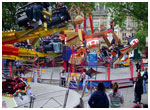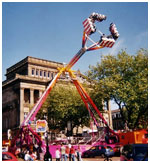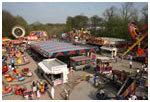


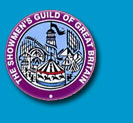
Menu
History
A Brief History of the Fair The history of fairs in Britain is very ancient. The origins are in pagan customs especially seasonal gatherings for festivals and trade. Fairs continued to be promoted by the Romans, who were once credited with introducing them, as the word fair is derived from the Latin ‘feria’ or holiday. Many fairs and festivals were later incorporated into the calendar of Christian festivals which was established over many centuries. Annual fairs were usually held on a set date often associated with a Saint’s feast day. A fair could last for a single day or over a number of days.
Close to 5,000 fairs were granted royal charters during the Middle Ages. The royal charter often recognised an existing fair, for example, Nottingham Goose Fair was granted a charter by Edward 1st in 1284, but was already an annual event. However, the granting of a royal charter did mean control and organisation of the fair could stay with a particular town, village or abbey. Modern fairs that can trace their lineage back to medieval charter are often proud to herald the fact.
 Panoramic view of Nottingham Goose Fair, 1890s©NFA Image Database
Panoramic view of Nottingham Goose Fair, 1890s©NFA Image Database
Many ancient fairs had a right in custom to continue to be held, even if they did not acquire a royal charter. Statute fairs or Mops began in the 14th century and their original purpose was the hiring of labourers. Even at the hiring fairs, however, a trade and amusement element was usually present. Indeed “with the hiring fairs the original purpose of the event was soon superseded by the amusement side”. 1 Many of these fairs declined towards the end of the nineteenth century, especially in their trading element as the amusements side of the events triumphed. These included acrobats, Illusionists, boxing booths and small theatrical performances.
Many of the great fairs originating in past times continue today. These include:
Barnstaple Fair in September;
Cambridge Fair in June;
Hull Fair in October;
Loughborough Fair which by tradition ends the fair season in November;
Nottingham Goose Fair is held at the end of September;
St Giles Fair in Oxford is also in September.
One of the few great fairs of today that does not have ancient origins is that held in Newcastle, which was founded in 1882.
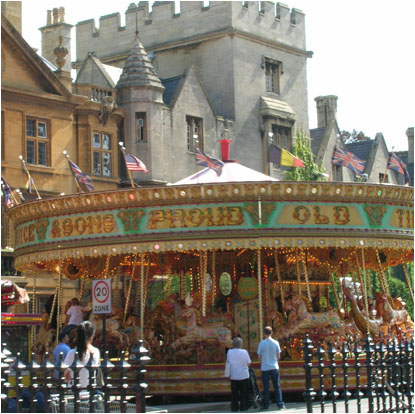 St Giles Fair, Oxford, in 1995©NFA Image Database
St Giles Fair, Oxford, in 1995©NFA Image Database
The first fairground rides were “small, crudely built out of wood and propelled by gangs of boys.” 2 However, steam power was set to change the nature of the fairground. An agricultural engineer called Frederick Savage devised a way of driving rides by steam in 1868. His invention was a steam engine mounted in the centre of the ride.
“Freed from the limitations of muscle power, rides could be made larger, more capacious and more heavily ornamented. The showmans’ demand for novelty was matched by the ingenuity of Savage and other engineers. In the wake of the steam revolution an amazing variety of new designs and rides appeared.” 3
Further inventions and innovations, in electrical engineering and hydraulics, have continued to spawn the ever more thrilling rides as seen in today’s fairgrounds. Interestingly, fairgrounds have been a site of innovation and pioneering: few of us are aware that the first moving picture shows – precursors of today’s cinema – were pioneered by Victorian Showmen such as Randall Williams.
Although an observer in 1874 predicted that fairs might become extinct, the tradition is very much alive and well. Fairground families are busy travelling for a good part of the year, providing the entertainments and food at many fairs and festivals across the country.
Between 1884 and 1891, evangelist George Smith referred to members of the itinerant community in Britain as ‘the dregs of society’ and proposed legislation to restrict the movement and lifestyle of the people. He was successful in bringing about restrictions on the movement of barge–dwellers, known as Bargees in 1884. In 1888, he introduced the Moveable Dwellings Bill into Parliament. This bill would force the registration of all moveable dwellings and compulsory school attendance. It also sought to empower local councils to enter and inspect dwellings and regulate so-called ‘moral irregularities’. These proposals aroused so much anger and hostility that Smith was chased out of Birmingham, and had to be given police protection in Leicester and Northampton!
In 1889, the leading Showmen of the day gathered at a meeting held in the Black Lion Hotel in Salford. From this and other gatherings, the Van Dwellers’ Protection Association was born, to safeguard and protect the interests of fairground people. The fairground community arranged public meetings across the country, distributed information pamphlets and collected petitions to Parliament. In the first year, a membership fund received donations from over 500 Showmen to fight George Smith’s Bill.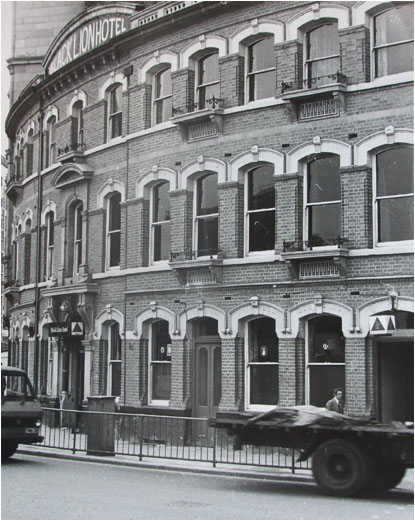 Black Lion Hotel, Salford ©Local History Library, Salford
Black Lion Hotel, Salford ©Local History Library, Salford
In November 1893 at a protest meeting held at the Rotherham Statutes Fair: The Movable Dwellings Bill was again debated:
“On Sunday afternoon last, the van-dwellers and other travellers who had assembled at the Rotherham Statute Fair held a meeting in Mr. Randall Williams Ghost Show. The large booth was filled to overflowing. Mr. B.T. Burnett, ex-president of the Association presided. He was supported by the Rev. T. Horne, chaplain of the Showmen’s Guild and Messrs. J. Dean, Randall Williams, Robert Williams, William Sedgwick, John Whiting, P. Collins, H. Hughes, J. Burton, Inshaw, Livesey, Murphy, Newsome and Hancock. (The Era, Nov 11, 1893)”. 5
The Moveable Dwellings Bill was finally defeated in 1894.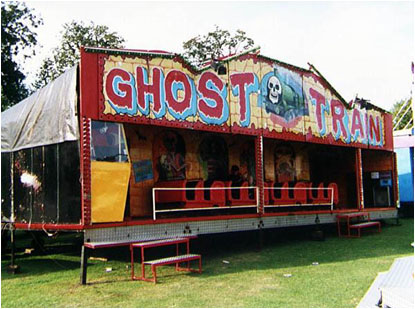 Contemporary Ghost train at Rotherham Fair ©NFA Image Database
Contemporary Ghost train at Rotherham Fair ©NFA Image Database
The Van Dwellers Protection Association came to be re–named over following years as the Showmen’s Guild. Its chaplain and first General Secretary was the Reverand Thomas Horne who was based in Didsbury, Manchester, and the Lancashire, Cheshire and North Wales Section of the Showmen’s Guild played a prominent role in these early years. The Showmen’s Guild was formally registered in 1917. 6
The Showmen’s Guild continues to act as a professional body and Employers’ Trade Union for the Showmen of Britain, protecting the way of life of the fairground families. It has fought restrictive legislation by being “the watchdog for the industry as a whole, the means by which the society is organised and the public face of the community.”7 The Guild organises annual regional dinners for city and town dignitaries, affectionately known as the ‘Chain Gangs’ in reflection of the numerous mayoral chains!
From the early efforts of the Van Dwellers Protection Association to the 20th and 21st century activity of the Showmen’s Guild, Showmen have developed a strong and very effective organisational network. This network is further sustained by the Showmen’s newspaper, the World’s Fair. First issued in 1904, this newspaper remains an important source of news and information for the community. It is a method of recruiting labour; buying and selling equipment; promoting forthcoming events and keeping Showmen up–to–date with fairground developments and innovation.
1 “Charter fairs – A History”, National Fairground Archive, 2007
2 Graham Downie/The Showmen's Guild, All The Fun Of The Fair, 1987
3 Ibid.
4 OFSTED, The Education of Travelling Children, April 1996, p.9
5 British Fairground Ancestors – Randall Williams
7 Dr Vanessa Toulmin, “From Van Dwellers to Showmen’s Guild”, National Fairground Archive, 1997, p.3,
This extract is from Here Comes the Fair, a teaching pack produced by the Ahmed Iqbal Ullah Education Trust in Manchester.
A Brief History of the Fair The history of fairs in Britain is very ancient. The origins are in pagan customs especially seasonal gatherings for festivals and trade. Fairs continued to be promoted by the Romans, who were once credited with introducing them, as the word fair is derived from the Latin ‘feria’ or holiday. Many fairs and festivals were later incorporated into the calendar of Christian festivals which was established over many centuries. Annual fairs were usually held on a set date often associated with a Saint’s feast day. A fair could last for a single day or over a number of days.
Close to 5,000 fairs were granted royal charters during the Middle Ages. The royal charter often recognised an existing fair, for example, Nottingham Goose Fair was granted a charter by Edward 1st in 1284, but was already an annual event. However, the granting of a royal charter did mean control and organisation of the fair could stay with a particular town, village or abbey. Modern fairs that can trace their lineage back to medieval charter are often proud to herald the fact.

Many ancient fairs had a right in custom to continue to be held, even if they did not acquire a royal charter. Statute fairs or Mops began in the 14th century and their original purpose was the hiring of labourers. Even at the hiring fairs, however, a trade and amusement element was usually present. Indeed “with the hiring fairs the original purpose of the event was soon superseded by the amusement side”. 1 Many of these fairs declined towards the end of the nineteenth century, especially in their trading element as the amusements side of the events triumphed. These included acrobats, Illusionists, boxing booths and small theatrical performances.
Many of the great fairs originating in past times continue today. These include:
Barnstaple Fair in September;
Cambridge Fair in June;
Hull Fair in October;
Loughborough Fair which by tradition ends the fair season in November;
Nottingham Goose Fair is held at the end of September;
St Giles Fair in Oxford is also in September.
One of the few great fairs of today that does not have ancient origins is that held in Newcastle, which was founded in 1882.

The first fairground rides were “small, crudely built out of wood and propelled by gangs of boys.” 2 However, steam power was set to change the nature of the fairground. An agricultural engineer called Frederick Savage devised a way of driving rides by steam in 1868. His invention was a steam engine mounted in the centre of the ride.
“Freed from the limitations of muscle power, rides could be made larger, more capacious and more heavily ornamented. The showmans’ demand for novelty was matched by the ingenuity of Savage and other engineers. In the wake of the steam revolution an amazing variety of new designs and rides appeared.” 3
Further inventions and innovations, in electrical engineering and hydraulics, have continued to spawn the ever more thrilling rides as seen in today’s fairgrounds. Interestingly, fairgrounds have been a site of innovation and pioneering: few of us are aware that the first moving picture shows – precursors of today’s cinema – were pioneered by Victorian Showmen such as Randall Williams.
Although an observer in 1874 predicted that fairs might become extinct, the tradition is very much alive and well. Fairground families are busy travelling for a good part of the year, providing the entertainments and food at many fairs and festivals across the country.
The Showmen’s Guild
“Public reactions to nomadic communities have seldom been sympathetic and have more often been marked by fear, suspicion, hostility and social rejection.” 4Between 1884 and 1891, evangelist George Smith referred to members of the itinerant community in Britain as ‘the dregs of society’ and proposed legislation to restrict the movement and lifestyle of the people. He was successful in bringing about restrictions on the movement of barge–dwellers, known as Bargees in 1884. In 1888, he introduced the Moveable Dwellings Bill into Parliament. This bill would force the registration of all moveable dwellings and compulsory school attendance. It also sought to empower local councils to enter and inspect dwellings and regulate so-called ‘moral irregularities’. These proposals aroused so much anger and hostility that Smith was chased out of Birmingham, and had to be given police protection in Leicester and Northampton!
In 1889, the leading Showmen of the day gathered at a meeting held in the Black Lion Hotel in Salford. From this and other gatherings, the Van Dwellers’ Protection Association was born, to safeguard and protect the interests of fairground people. The fairground community arranged public meetings across the country, distributed information pamphlets and collected petitions to Parliament. In the first year, a membership fund received donations from over 500 Showmen to fight George Smith’s Bill.

In November 1893 at a protest meeting held at the Rotherham Statutes Fair: The Movable Dwellings Bill was again debated:
“On Sunday afternoon last, the van-dwellers and other travellers who had assembled at the Rotherham Statute Fair held a meeting in Mr. Randall Williams Ghost Show. The large booth was filled to overflowing. Mr. B.T. Burnett, ex-president of the Association presided. He was supported by the Rev. T. Horne, chaplain of the Showmen’s Guild and Messrs. J. Dean, Randall Williams, Robert Williams, William Sedgwick, John Whiting, P. Collins, H. Hughes, J. Burton, Inshaw, Livesey, Murphy, Newsome and Hancock. (The Era, Nov 11, 1893)”. 5
The Moveable Dwellings Bill was finally defeated in 1894.

The Van Dwellers Protection Association came to be re–named over following years as the Showmen’s Guild. Its chaplain and first General Secretary was the Reverand Thomas Horne who was based in Didsbury, Manchester, and the Lancashire, Cheshire and North Wales Section of the Showmen’s Guild played a prominent role in these early years. The Showmen’s Guild was formally registered in 1917. 6
The Showmen’s Guild continues to act as a professional body and Employers’ Trade Union for the Showmen of Britain, protecting the way of life of the fairground families. It has fought restrictive legislation by being “the watchdog for the industry as a whole, the means by which the society is organised and the public face of the community.”7 The Guild organises annual regional dinners for city and town dignitaries, affectionately known as the ‘Chain Gangs’ in reflection of the numerous mayoral chains!
From the early efforts of the Van Dwellers Protection Association to the 20th and 21st century activity of the Showmen’s Guild, Showmen have developed a strong and very effective organisational network. This network is further sustained by the Showmen’s newspaper, the World’s Fair. First issued in 1904, this newspaper remains an important source of news and information for the community. It is a method of recruiting labour; buying and selling equipment; promoting forthcoming events and keeping Showmen up–to–date with fairground developments and innovation.
1 “Charter fairs – A History”, National Fairground Archive, 2007
2 Graham Downie/The Showmen's Guild, All The Fun Of The Fair, 1987
3 Ibid.
4 OFSTED, The Education of Travelling Children, April 1996, p.9
5 British Fairground Ancestors – Randall Williams
7 Dr Vanessa Toulmin, “From Van Dwellers to Showmen’s Guild”, National Fairground Archive, 1997, p.3,
This extract is from Here Comes the Fair, a teaching pack produced by the Ahmed Iqbal Ullah Education Trust in Manchester.

